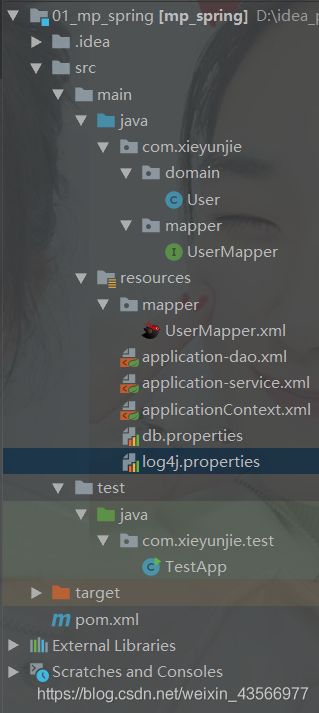spring整合Mybatis-plus
spring整合Mybatis-plus
今天就随便说说spring整合mybatis-plus,就不再搭建一个web项目了,简单做一个测试类。
既然是spring,那就少不了各种xxx.xml配置文件。
那就先说说配置文件
<1>. application-dao.xml
dao层的配置,他的核心就是要产生Mapper代理对象
1、数据源的配置
<context:property-placeholder
location="classpath:db.properties" system-properties-mode="FALLBACK" />
2、数据源的配置
<bean id="dataSource"
class="org.springframework.jdbc.datasource.DriverManagerDataSource">
<property name="driverClassName" value="${driver}">property>
<property name="url" value="${url}">property>
<property name="username" value="${user}">property>
<property name="password" value="${password}">property>
bean>
3、SqlSessionFactory
<bean id="sqlSessionFactory"
class="com.baomidou.mybatisplus.extension.spring.MybatisSqlSessionFactoryBean">
<property name="dataSource" ref="dataSource">property>
<property name="globalConfig" ref="globalConfig">property>
<property name="mapperLocations">
<array>
<value>classpath:mapper/*Mapper.xmlvalue>
array>
property>
<property name="plugins">
<array>
<bean class="com.baomidou.mybatisplus.extension.plugins.PaginationInterceptor">
bean>
array>
property>
bean>
<bean id="globalConfig" class="com.baomidou.mybatisplus.core.config.GlobalConfig">
<property name="dbConfig" ref="dbConfig">property>
bean>
<bean id="dbConfig" class="com.baomidou.mybatisplus.core.config.GlobalConfig.DbConfig">
<property name="idType" value="AUTO">property>
bean>
4、产生Mapper接口的代理对象
<bean class="org.mybatis.spring.mapper.MapperScannerConfigurer">
<property name="basePackage"
value="com.xieyunjie.mapper">property>
<property name="sqlSessionFactoryBeanName"
value="sqlSessionFactory">property>
bean>
<2>. application-service.xml
<context:component-scan base-package="com.xieyunjie.service">
context:component-scan>
<3>. applicationContext.xml
<import resource="classpath:application-dao.xml"/>
<4>. db.properties
driver=com.mysql.cj.jdbc.Driver
url=jdbc:mysql://127.0.0.1:3306/test?useUnicode=true&characterEncoding=utf8&useSSL=true&serverTimezone=UTC
user=root
password=root
<5>. log4j.properties
# Global logging configuration
log4j.rootLogger=DEBUG, stdout
# MyBatis logging configuration...
log4j.logger.org.mybatis.example.BlogMapper=TRACE
# Console output...
log4j.appender.stdout=org.apache.log4j.ConsoleAppender
log4j.appender.stdout.layout=org.apache.log4j.PatternLayout
log4j.appender.stdout.layout.ConversionPattern=%5p [%t] - %m%n
一、目录结构
二、创建一个实体类
@Data
@AllArgsConstructor
@NoArgsConstructor
@ToString
@TableName(value="sys_user")//建立User.class和数据的sys_user表的关系
public class User implements Serializable{
private static final long serialVersionUID = 1L;
//字段名和表中的名字一样时可以不加以下注解,不同时需要加上该注解
@TableId(value="id") //代表它是主键
private Integer id;
@TableField(value="name")
private String name;
private String address;
private Date birth;
}
三、创建一个mapper接口(dao层)
public interface UserMapper extends BaseMapper<User> {
}
四、创建一个mapper.xml的映射文件
DOCTYPE mapper PUBLIC "-//mybatis.org//DTD Mapper 3.0//EN" "http://mybatis.org/dtd/mybatis-3-mapper.dtd" >
<mapper namespace="com.xieyunjie.mapper.UserMapper" >
mapper>
五、进行测试
创建一个userMapper对象,进行测试
ApplicationContext context=new ClassPathXmlApplicationContext("classpath:applicationContext.xml");
UserMapper userMapper=context.getBean(UserMapper.class);
- 分页查询
private static void query5(UserMapper userMapper){
IPage<User> page=new Page<>(1,5);
userMapper.selectPage(page,null);
long total=page.getTotal();
System.out.println("总条数:"+total);
List<User> list=page.getRecords();
print(list);
}
- 根据姓名进行查询
private static void query4(UserMapper userMapper,String name){
Integer count=userMapper.selectCount(null);
QueryWrapper<User> queryWrapper=new QueryWrapper<>();
queryWrapper.like(name!=null,"name",name);
Integer selectCount=userMapper.selectCount(queryWrapper);
System.out.println(selectCount);
}
- 根据Id进行查询
private static void query1(UserMapper userMapper){
User user=userMapper.selectById(3);
System.out.println(user);
}
- 将需要的数据放到一个Map集合里面进行查询
private static void query3(UserMapper userMapper){
Map<String,Object> columnMap=new HashMap<>();
columnMap.put("name","小荥");
columnMap.put("address","南阳");
List<User> list=userMapper.selectByMap(columnMap);
print(list);
}
- 将需要的数据放到一个List集合里面进行查询
private static void query2(UserMapper userMapper){
//先放到一个集合里面,最后进行查询
Collection<Serializable> idList=new ArrayList<Serializable>();
idList.add(2);
idList.add(3);
idList.add(4);
List<User> list=userMapper.selectBatchIds(idList);
print(list);
}
- 删除数据
private static void deleteUser(UserMapper userMapper){
//根据主键删除
userMapper.deleteById(1);
//批量删除。先放到一个集合里面,然后删除
Collection<Serializable> idList=new ArrayList<Serializable>();
idList.add(22);
idList.add(112);
userMapper.deleteBatchIds(idList);
//根据map集合进行删除
Map<String,Object> columnMap=new HashMap<String,Object>();
columnMap.put("id",6);
columnMap.put("name","小明");
userMapper.deleteByMap(columnMap);
//根据wrapper进行删除
QueryWrapper<User> wrapper=new QueryWrapper<>();
userMapper.delete(wrapper);
}
- 修改数据
private static void updateUser(UserMapper userMapper){
//根据主键修改
userMapper.updateById(new User(112,"小荥荥","北京",new Date()));
UpdateWrapper<User> updateWrapper=new UpdateWrapper<>();
updateWrapper.eq("name","小荥荥");
updateWrapper.between("id",1,5);
userMapper.update(new User(112,"小荥","武汉",new Date()),updateWrapper);
}
测试的结果这里就不再进行展示了,大家可以自行去测试
源码链接
